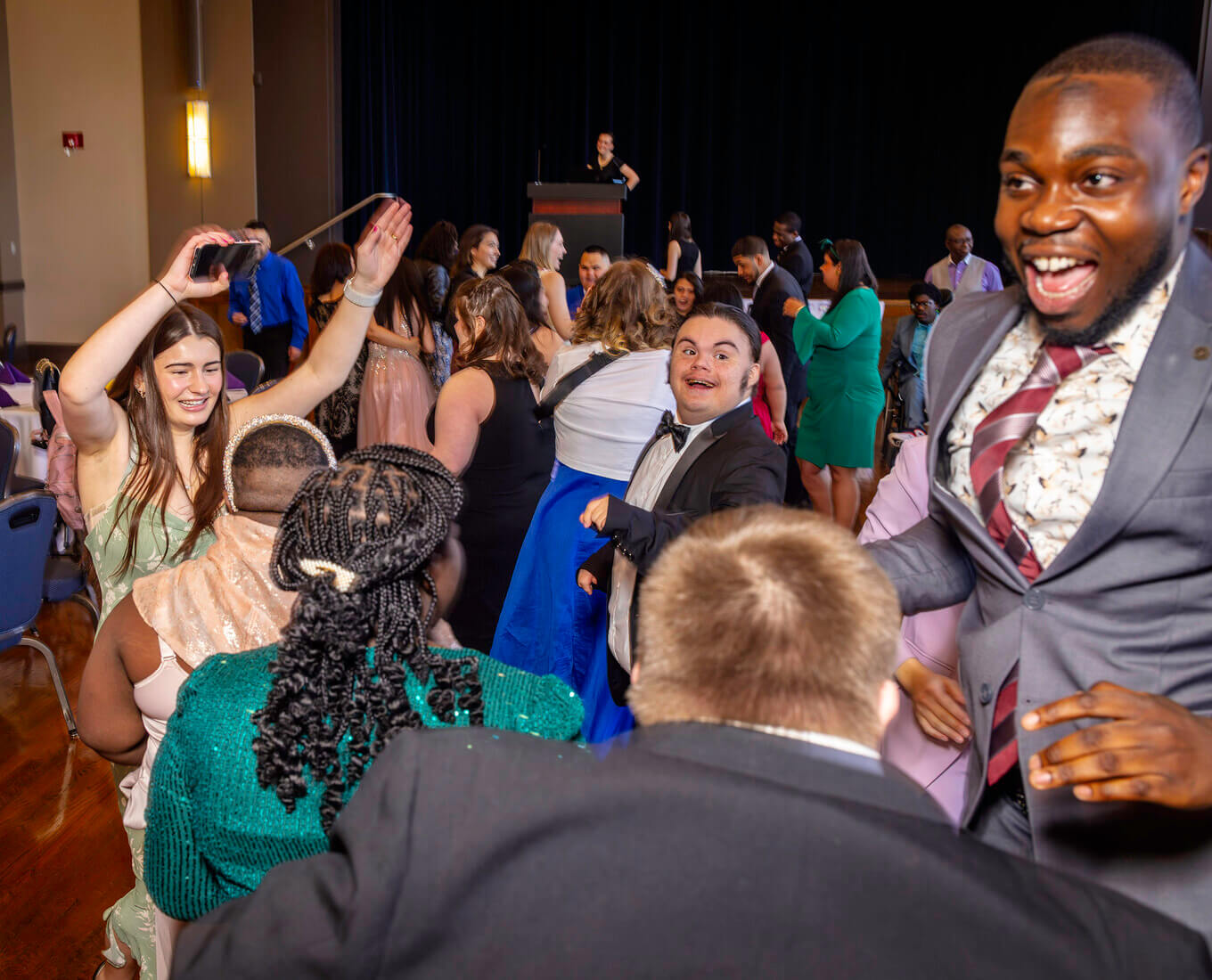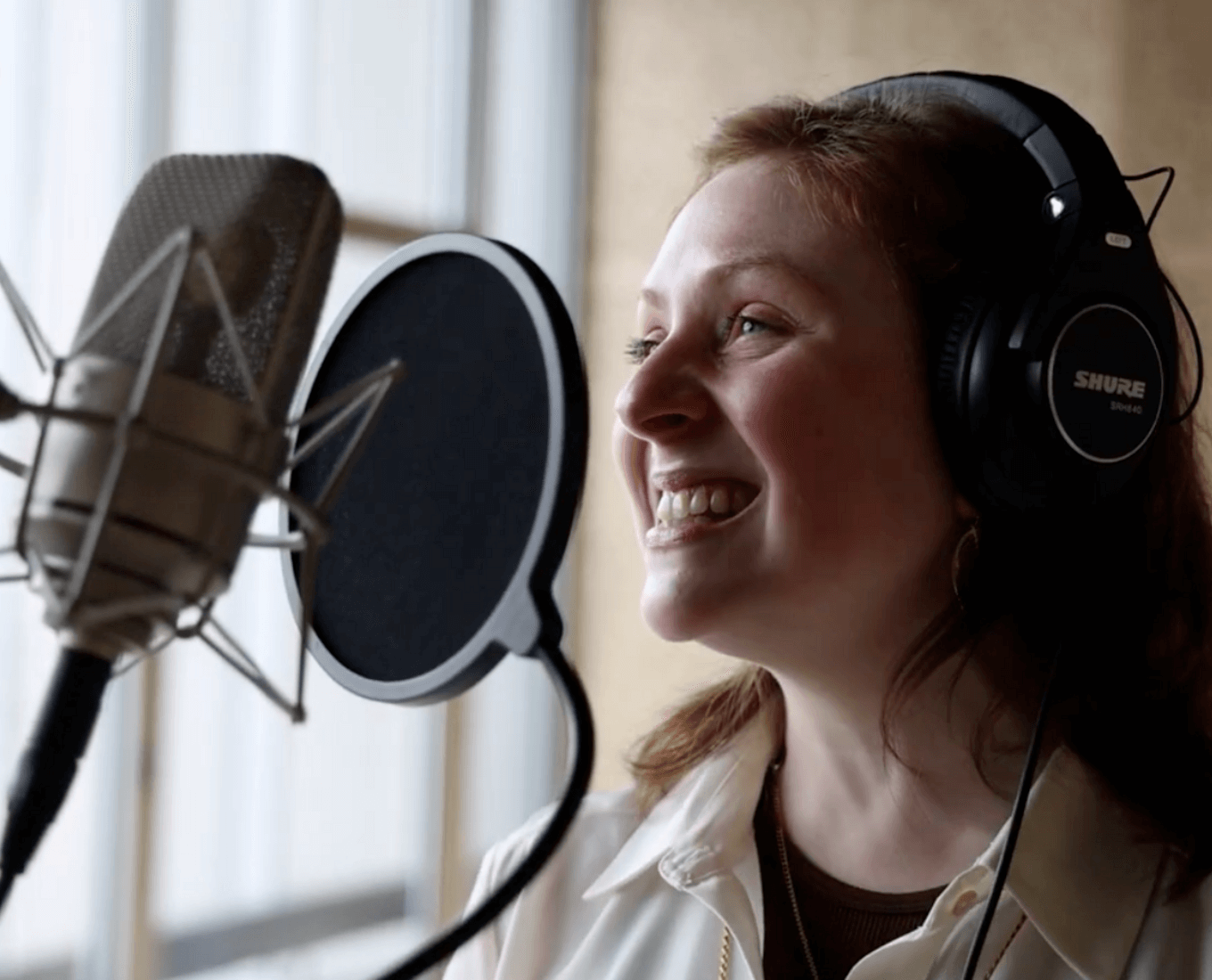Melissa (Pierre) DeChellis "02 needed an ambulance.
Instead, she was bouncing around in the back of a pickup truck, on a winding mountain road on the Caribbean island of Dominica. That morning, she had woken up with pain and swelling in her right leg and, instead of going to her classes at Ross University School of Medicine as planned, she needed immediate medical attention. It turned out to be a blood clot, in the same leg that had endured a congenital clubfoot throughout her childhood and 15 reconstructive surgeries throughout her late teens and 20s.
"It was a great American medical school, but you [still] don't want to become sick when you're on a remote island," DeChellis says. "They took me to an adobe hut of a hospital, where I became infected with parasites. They needed to MedFlight me to Puerto Rico."
In Puerto Rico, DeChellis used the medical Spanish she learned during an immersion and medical service trip to Guatemala years before, advocating for her care in her second language. Meanwhile, she was trying to get in touch with a vascular surgeon at Brigham and Women's Hospital in Boston for whom she had worked in a research job. With the surgeon's help, DeChellis was able to arrange a MedFlight home to Boston, so doctors at Brigham and Women's could treat her leg.
"I was not sure I would make it off either of the islands," DeChellis says, thinking back on the November 2007 ordeal. "At first, they tried multiple procedures to save the leg, but several years later in late 2012, my leg was completely compromised, and I had a really difficult decision to make: salvage what was left of my leg or amputate it. I was facing several surgeries and probably a lifetime of intolerable, chronic pain. Having been in chronic pain before, from all the reconstructive surgeries and years of immobility that followed, it was a difficult decision, but probably one of the clearest and best decisions of my life. Not many people have the opportunity to hit a reset button — and making the decision to electively amputate my leg was my reset button."
362 Steps
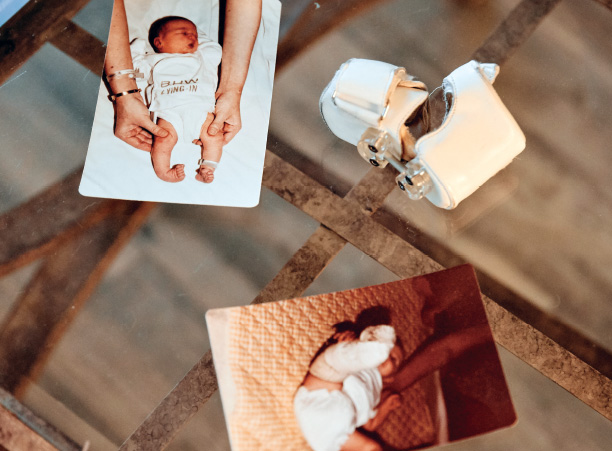 Photos of DeChellis as a baby sit with her infant foot brace.
Photos of DeChellis as a baby sit with her infant foot brace.DeChellis still remembers there were exactly 362 steps from her freshman dorm at the top of campus, Hanselman Hall, down to Kimball Dining Hall. Many a Holy Cross student has bemoaned the steep descent to Kimball — especially during Worcester's icy winters — but it was different for DeChellis. She spent the majority of her college years with her right leg in a cast and used crutches to get around — a feat on any campus, but especially arduous on the legendary hills of Mount St. James. She jokes she now uses those well-developed arms in CrossFit workouts, but it was a challenging time.
"It made me think twice about those three meals a day," she says of the distance from Hanselman to Kimball. "And during the winter months, I was a frequent flyer with the Holy Cross public safety officers, who would drive me to class: me and my backpack full of heavy science books."
Despite these obstacles, she was determined to finish her degree because it was her lifelong dream to go to medical school and become a pediatric orthopedic surgeon — the same type of specialist that helped her overcome her clubfoot as a child. Plus, DeChellis says, "I fell in love with the campus the moment I stepped foot on it. It was gorgeous, expansive."
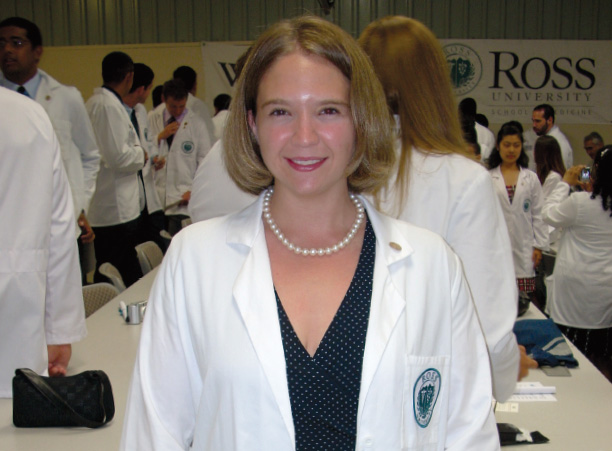 DeChellis during medical school.
DeChellis during medical school."I was living a lifelong dream," she says of studying medicine at Ross, "but in a second, everything can be flipped upside down. I was less than a year into medical school when the blood clot happened."
Together with her husband, Mike, in 2013, DeChellis decided to amputate her right leg below the knee, even though it meant leaving medical school and an arduous recovery process "At that point, my leg had just been a hindrance, and we made the decision to move forward without it," she says. "All I needed to know from him was that he was in full support. And he told me to get rid of that ugly leg and get a new one." DeChellis underwent the amputation of her right leg on April 4, 2013.
Road to Recovery
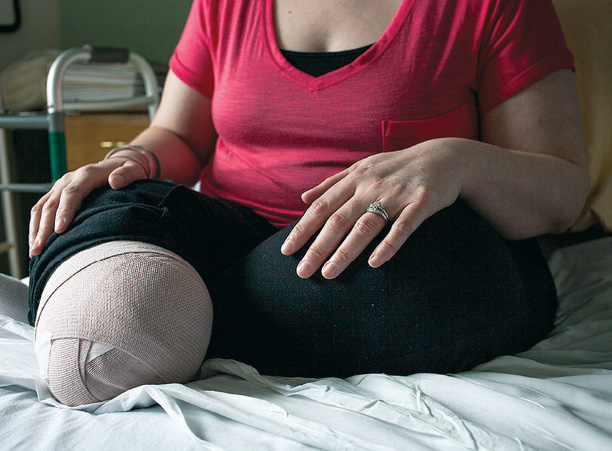 DeChellis after her elective amputation.
DeChellis after her elective amputation."Melissa was down at the end of the table, and you could tell she was brand-spanking new — lots of questions, lots of confusion, pretty angry," Gray remembers from their first meeting. "She was just scrambling to make a connection. The one thing I noticed about her was her medical knowledge. She was very well-spoken and she just kind of stood out from everybody in that room that day. We connected right off the bat."
Gray became DeChellis' mentor, offering emotional support and advice about prosthetics and living without a limb. Today, the 66-year-old Gray says she and DeChellis, 39, are family: "Melissa is like my adopted daughter."
There were more amputees than usual at Spaulding in the bombing's aftermath, and DeChellis said the atmosphere was one of camaraderie and support as everyone tried to recover and learn to walk with prosthetics. But the influx of patients made it hard for prosthetic providers to keep up, and DeChellis experienced complications at her amputation site while waiting for a prosthetic leg.
"Unfortunately, because there were so many people that needed legs all at the same time, there was a bottleneck for prosthetics," she says. "I didn't get a leg in the most timely manner, which then led to me needing a pretty extensive revision surgery in 2015 that took 6 more inches off my leg. It was a huge step back for me, and I think that the second time was a little bit more emotionally straining."
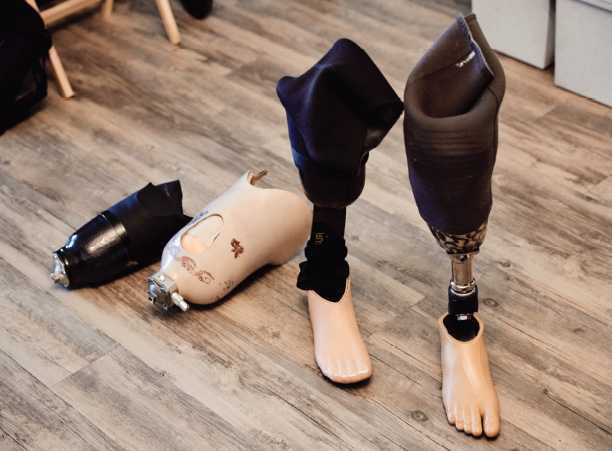 A few of DeChellis' prosthetics.
A few of DeChellis' prosthetics.With the support of her husband and Gray, DeChellis' entire world revolved around her recovery and physical therapy. Continuing complications with her leg led to prolonged hospital stays and prevented her from holding a job.
"My husband worked for both of us while we incurred unfathomable medical costs. I could feel myself changing from a fiercely independent, adventurous and outgoing person to one who was held prisoner in my own body and home," she says of the first few years of her recovery.
But a chance meeting changed everything. One of DeChellis' friends from recovery at Spaulding is Heather Abbott, a Boston Marathon bombing survivor, whose eponymous foundation helps amputees obtain prosthetic limbs.
At a fundraiser for Abbott's organization, DeChellis heard about a program in Texas called the Adaptive Training Foundation (ATF). ATF is a nine-week, boot camp-style program that helps amputees bridge the gap between rehab and adaptive sports. DeChellis saw an opportunity to "tap back into that inner athlete" she had been before her high school softball injury and get involved in adaptive sports, competitive and recreational sports for people with disabilities.
Turning Point in Texas
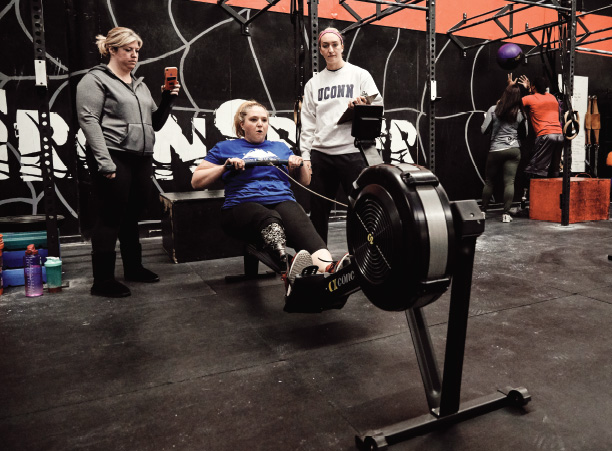 DeChellis exercises on a rowing machine.
DeChellis exercises on a rowing machine.But then she got to work in personalized exercise sessions with Rossman, and in mindfulness and mental health trainings. The ATF trainers help amputee athletes adapt traditional exercises, such as cardio or weightlifting, and make them possible and accessible with limb loss. Under Rossman's guidance, DeChellis ran for the first time in years, on a treadmill surrounded by fellow amputees and wounded warriors from the military, all clapping and cheering her on.
"It was wonderful when she realized that she could run and did run," Rossman says. "We have this adaptive curved treadmill that is activated by the pressure of the athlete running on it. [I remember] Melissa was running on it, and it was pretty exciting for her, pretty exciting for everybody."
Running was one of many post-amputation firsts for DeChellis in Texas. She jumped again. She performed a box jump, a CrossFit move in which athletes launch from the ground up onto a box in front of them. She lifted a barbell for the first time. During a trip with the group to Park City, Utah, she got on skis for the first time since her surgeries. And by the end of the nine weeks, DeChellis had completed her first CrossFit workout and discovered she loved the challenge.
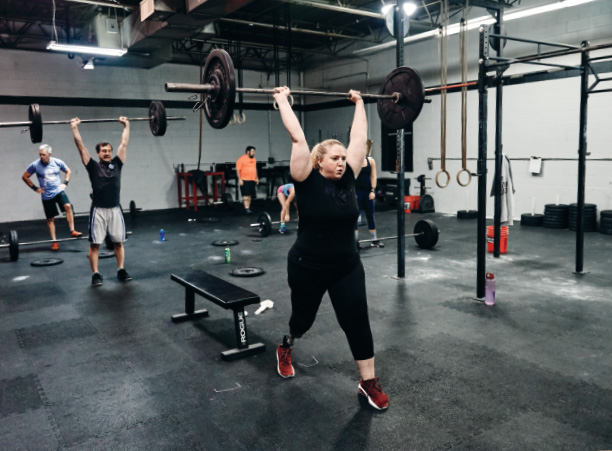 DeChellis lifts a barbell during a CrossFit workout.
DeChellis lifts a barbell during a CrossFit workout.Rossman remembers that DeChellis was also constantly encouraging the other athletes as she worked toward her own milestones. "Everyone in her class at ATF gravitated toward her," she says. "They knew the compassion in her heart and care for them; her nonstop 'I can do this' was so inspiring to the other athletes there." DeChellis received the organization's very first Iron Man (or Woman) Award, an honor voted by her peers.
At the program's graduation ceremony, DeChellis and Rossman learned that it was Rossman's donation that had enabled DeChellis to participate in the program.
"It was the biggest wave of emotion," DeChellis says, thinking back to that moment. "I mean, how do you thank somebody that truly helped give you your life back?"
Back to Boston
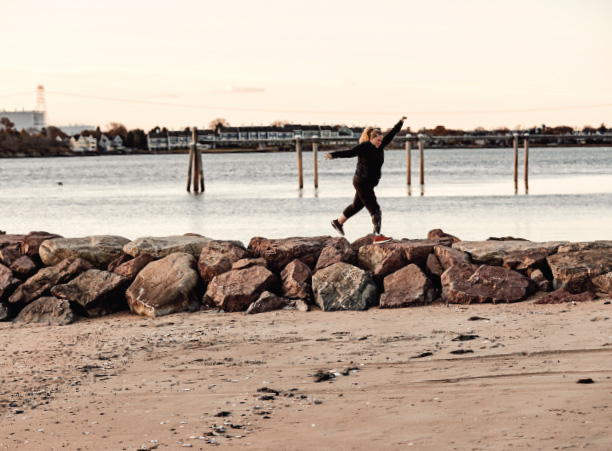 DeChellis walks on a beach in Beverly, Massachusetts.
DeChellis walks on a beach in Beverly, Massachusetts.As her life began to stabilize, DeChellis reflected that she had been hiding her leg during the beginning of her recovery, treating it as an imperfection to be hidden by clothes and fabric. Friends and family were not very supportive during her initial recovery, which fueled DeChellis' desire to eventually found a nonprofit support and activity group for new amputees, creating the community many lack following a life-changing event like an amputation.
"It took me a while to eventually feel comfortable in my own skin. And it was going down to Texas — and truly challenging myself mind, body and soul — that led me to accept myself for who I am, with all of the imperfections," she says. "From that point forward, I haven't hidden my leg. It's been a work in progress and took me a while to find my confidence, but I'm proud to show who I am and what I've been through."
Now, DeChellis often wears colorful, laser-printed covers that wrap around her prosthetic leg. It seems fitting for someone with a mentor like Gray, who has Swarovski crystals on her prosthetic leg: "I blinged it out," Gray laughs.
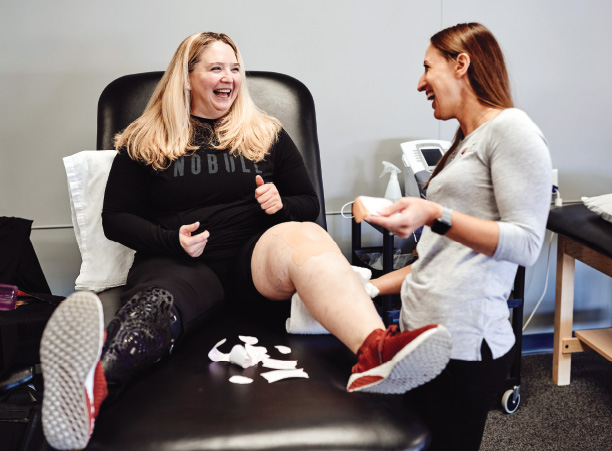 DeChellis laughs during a doctor's appointment.
DeChellis laughs during a doctor's appointment.She frequently tags her posts #perfectlyimperfect and #progressnotperfection, and shares pictures of everything from hikes with her husband and their dog, Dolly, and CrossFit workouts in the gym, to post-surgery progress updates. She compares it to Japanese Kintsugi pottery: "When a piece of pottery breaks, they glue the pieces back together, but they paint the cracks in gold, showing that scars can be beautiful. I like the person I am now more than the person I was before [limb loss]. It put the pieces back a little differently, into a stronger, more confident and adventurous version of myself. And I share that I'm in progress, not perfect, and I like to embody the idea of being perfectly imperfect."
Forming Community
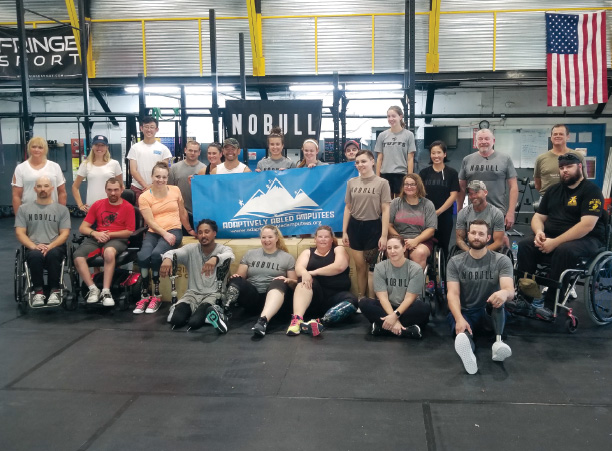 DeChellis and the Adaptively Abled Amputees group.
DeChellis and the Adaptively Abled Amputees group."There is Anna, I call her Daughter Number Two," Gray says. "She came to America from Poland for an amputation. Melissa has been the best support [for Anna], giving her rides to where we go for workouts or rides to the doctor, if she needs food — every aspect she has been there for her."
Now that DeChellis has found her way, she wants to help make the path easier for others. Even with a mentor and support group at Spaulding, she still found the recovery process lonely and isolating. This led DeChellis to form New England's first social and activity group for those living with limb loss and their family members: Adaptively Abled Amputees. The nonprofit offers support groups, social events and adaptive sports, all with the aim of creating a community for people living with limb loss. It has 140 members, with 30 to 40 attending monthly support group meetings and social outings.
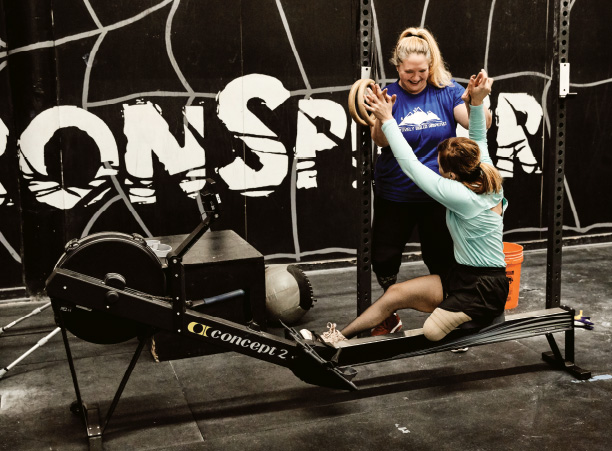 DeChellis cheers on another adaptively abled amputee.
DeChellis cheers on another adaptively abled amputee.Gray was the oldest athlete to take part in the program, and she noticed an immediate difference in her day job as an antique dealer: "I play golf, but you know, I'm older; you get stiff. I cannot believe the change in six weeks in my mobility, my agility, my balance. I'm flipping tires and I'm throwing ropes. I'm doing pull-ups. They adapt it to what your needs are. I'm always lifting at my antique business and the change in my strength is crazy."
After a successful pilot, DeChellis is on the hunt for funding and sponsorship to offer a second session and make Adaptively Abled Fitness an ongoing program. "I was her mentor, but I gotta tell you, she's mentoring me more than I ever anticipated at my age," Gray says. "Her tenacity to get this up and going, the hours, the work, the dedication — I'm just her wingman."
Rebirth
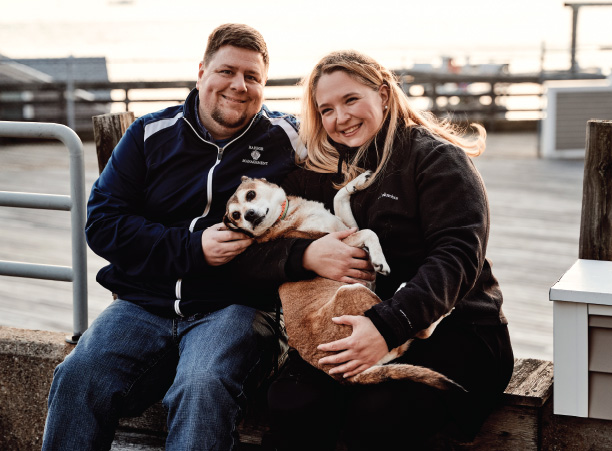 DeChellis poses with her husband, Mike, and dog, Dolly.
DeChellis poses with her husband, Mike, and dog, Dolly."I chose the symbols of the arrow, meaning moving forward, and a phoenix giving rebirth to oneself from the ashes, because I truly believe everything in my life has led me down this unique path," DeChellis says. "Losing my leg was just the beginning of the life I'm living now and it was my reset button and my rebirth.
"I truly feel like grit is what helped me get through all of the difficult parts of my journey — grit and perseverance. From that moment in April 2013, it has been a wild and crazy journey, but it's opened my mind and my heart. I've developed a new perspective and I was led down a path that I never would have foreseen for myself otherwise, had I not been in that particular circumstance and in that situation."
Written by Maura Sullivan Hill for the Winter 2020 issue of Holy Cross Magazine.
About Holy Cross Magazine Holy Cross Magazine (HCM) is the quarterly alumni publication of the College of the Holy Cross. The award-winning publication is mailed to alumni and friends of the College and includes intriguing profiles, make-you-think features, alumni news, exclusive photos and more. Visit magazine.holycross.edu/about to contact HCM, submit alumni class notes, milestones, or letters to the editor.

